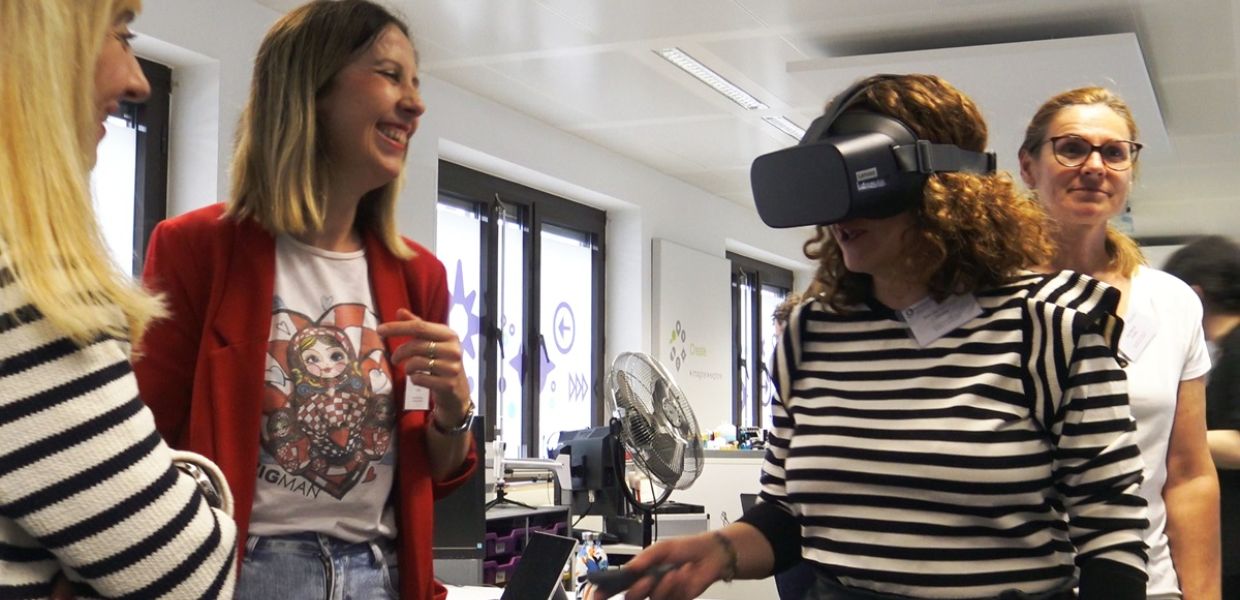After numerous activities at national and international level, in the last year we reached more than 2,300 formal and non-formal educators, introducing them to the wealth of the Europeana Initiative's digital cultural heritage resources. This in turn saw an indirect impact on more than 27,600 students.
The focus was on the reuse of digital cultural heritage and its crucial role in education, preservation, research, cultural exchange and lifelong learning. In addition, educators explored how the Europeana Initiative's resources can be used to make connections between the real and digital world.
'Digital education with cultural heritage' 2024 MOOC
This year marked the debut of the 'Digital education with cultural heritage' MOOC in two new languages. The course ran from late April to the first week of June in Latvian and Dutch and attracted more than 250 registered educators. The reiteration of the course included updated content and online live events aiming to create a dynamic learning experience. The updated course content strengthened the link between formal and informal education and increased appreciation for cultural heritage among course participants and, indirectly, students.
National activities
Europeana Education Ambassadors conducted many national activities, training educators on the search and reuse of resources available through Europeana.eu and the Teaching with Europeana blog.
In total, over 60 national activities took place in Belgium, Croatia, Greece, Italy, Latvia, Malta, Portugal, Romania, Spain and Turkey, engaging over 2,240 formal and non-formal educators. The Europeana Education Ambassadors conducted around 50 training courses, in addition to sessions related to the project within workshops and events organised independently of this.
Scientix® Digital Cultural Heritage Award
Developed within the framework of the 2024 STEM Discovery Campaign, the Scientix Digital Cultural Heritage Award honored those who implemented a learning scenario from the Teaching with Europeana blog, shared the process creating a Story of Implementation and pinned the story to the STEM Discovery Campaign map. Out of more than 4, 600 entries submitted in this year’s STEM Discovery Campaign, around 380 activities posted from 21 countries were eligible for this Award. Through a structured judging process, the 21 winners of the Award were identified and won a trip to Brussels to attend the Europeana Workshop (described below).
New Stories of Implementation
About 140 new Stories of Implementation, which describe the implementation of Europeana's learning scenarios in an educational setting, were collected this year, mainly due to the national activities organised by Ambassadors. In addition, educators had the chance to directly contribute to the Teaching with Europeana blog by submitting stories of implementation through a dedicated online form. The majority of the newly collected Stories of Implementation are in English, while some were also created in Dutch Greek, Italian, Latvian, Romanian and Spanish, enlarging Europeana's multilingual offer of educational resources for teachers. All these materials are available online on the Teaching with Europeana blog.
Europeana Micro-Stories of Implementation
A new activity was introduced with great success this year: the micro-Story of implementation. Educators were invited to use any Europeana Initiative resource in class or in a non-formal education setting and tell the world about it by pinning their micro-Story of Implementation to the Digital Cultural Heritage Story map. In their micro-stories, educators indicated which resources they used from Europeana.eu and/or the Teaching with Europeana, and briefly described how they used them and which the main outcomes for them and for their students were. More than 1,100 activities were collected and are currently accessible through this map, proving that plentiful Europeana resources can be reused in a formal or non-formal educational setting.
The Europeana Micro-Stories of Implementation Challenge ran from December 2023 to the end of April 2024. This challenge invited educators to submit high-quality micro-stories of implementation and awarded six participants who submitted the greatest number of outstanding micro-stories. The winners were also invited to the Europeana workshop in Brussels.
The Teaching with Europeana blog
Between September 2023 and June 2024, more than 18,389 users accessed the Teaching with Europeana blog, resulting in over 83,335 page views. The blog attracted readers from around the globe and its captivating content has become a go-to source for insightful articles in the form of the monthly 'Updates', ready-to-use learning scenarios and well-crafted Stories of Implementation of existing learning scenarios.
This year, the blog has been enriched with more Stories of Implementation, and we published updates on topics from new transformative technologies in digital cultural heritage education, like AI, 3D digitisation and AR/VR, to open-schooling and European and cultural identities. All these resources constitute valuable tools for educators who want to innovate, advance professionally, and provide meaningful learning experiences and essential future skills to their students.
The Europeana workshop
In June, 36 educators including the winners of the Scientix Digital Cultural Heritage Award, Europeana Ambassadors and winners of the Europeana Micro-Stories of Implementation Challenge, joined the European Schoolnet team in Brussels for a face-to-face workshop in the Future Classroom Lab (FCL). During two days of extensive collaboration and productive brainstorming, educators engaged in discussions on innovative ideas for teaching, as well as the vital role and transformative use of digital cultural heritage in education.
On day one, educators had some hands-on testing of tools and equipment available in FCL. They also worked collaboratively on creating educational activities combining the digital cultural heritage items made available through Europeana.eu with environmental sustainability tools and resources.
On day two, they experienced firsthand the cultural heritage of Brussels through a guided tour of the medieval part of the city. Then, after a session on the topic of digital cultural heritage in the era of AI, they were introduced to AI tools and used them to create educational experiences bridging real-world and the digital cultural heritage.




